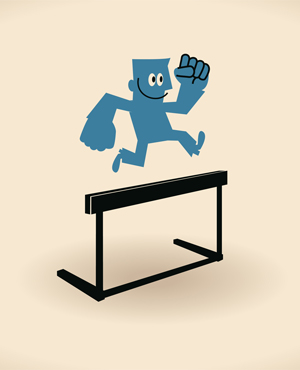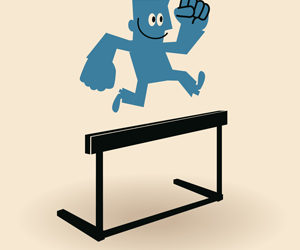 Does exam anxiety creep in on you the night before the test? For many, exam anxiety can lead to the freeze response of the freeze, flight, or fight automatic reactions. The trick lies in ensuring that you don’t grow overwhelmed by anxiety to the point of mental fogginess, when the answers you know by heart no longer come readily to mind.
Does exam anxiety creep in on you the night before the test? For many, exam anxiety can lead to the freeze response of the freeze, flight, or fight automatic reactions. The trick lies in ensuring that you don’t grow overwhelmed by anxiety to the point of mental fogginess, when the answers you know by heart no longer come readily to mind.
Engagingly, Edmund Bourne writes about a myriad of strategies for combating exam anxiety in his book The Anxiety and Phobia Workbook. The book’s strategies pertain primarily to people undergoing extreme anxiety conditions such as panic attacks, OCD, and agoraphobia (agoraphobia involves the fear of immersing oneself in certain spaces, especially with no clear escape, such as malls, airplanes, grocery stores and even in the driver’s seat on the highway). Yet, these strategies at alleviating anxiety can help even the most passionate exam takers abate unwanted stress and tension?calming your nerves and boosting your grades.
My own plight with anxiety stemmed from a workplace situation, in which boredom and purposelessness plagued me. In light of the dearth of stimulus, I began to get panic attacks that manifested as workplace agoraphobia. I tried infusing purpose into my workplace environment by calling upon Buddhist spirituality, with which we seek to see the benefits of our work on others. By being altruistic, we gain a sense of purpose?and a sense of purpose can help dispel unwanted anxiety. Yet, in spite of me finding such purpose in altruistic acts, each day, the panic for me would arise, lasting for numerous hours, disabling me with a spacey, terror-filled mindset, accompanied by OCD attacks during which I would check my belongings repetitively.
I thereafter sought entrepreneurial and related work to avoid being stymied by an office place scenario. In sum, I developed a phobia, or a fear of office settings, avoiding them altogether. What a shame, as I enjoy the role of an employee.
The Anxiety and Phobia Workbook presents a number of excellent strategies for beating the anxiety just as you start to feel it surface. These strategies, I believe, can help alleviate exam related anxiety, nipping it in the bud and allowing you to perform at peak level.
Mind you, I haven’t taken an exam since developing workplace anxiety, as I tend to avoid classes that contain an exam component. Avoidance is the hallmark of phobias. The graduate level program appealed to me due to its absence of exams, which seems to remove the threat of exam anxiety. However, reading strategies for abating anxiety from Dr. Edmund J. Bourne gives me hope that I may one day tackle an exam without serious repercussion.
What To Do When the Anxiety First Surfaces
As soon as I feel the anxiety surface, my mind attaches to the thought, “I’m going to lose control.” Sure enough, moments later, my mind races, attaches to worrisome thoughts, and grows spacey. Simple tasks overwhelm me with fear. An exam seems like an impossible undertaking.
Yet, Edmund J. Bourne advises to just let the anxiety flow through you without judging it as dangerous. The anxiety will pass, as anxiety is time limited.
But if you don’t have the time for that when the anxiety starts to come on, there are a number of tasks you can do to help alleviate it. For one, you could always use a distraction technique such as pulling out a piece of gum and chewing on it. That’s a perfect exam strategy.
Another strategy involves counting the people in front of you and around you or counting backward from one hundred in groups of three (100, 97, 94, etcetera). This strategy seems optimal for the time when you are waiting for the exam to begin. Counting proves highly beneficial in serving as yet another distraction strategy.
Put a rubber band on your wrist and snap it when the anxiety comes on. This will serve as yet one more distraction strategy.
Additionally, try taking a deep breath through your nose, holding the breath until you can’t any longer, releasing, and then repeating for up to three times. Alternatively, you could do deep abdominal breathing, preferably through the nose, for three minutes. Abdominal breathing involves allowing your area below your rib cage to naturally rise with the intake of breath and fall with the outtake of breath.
Also, if anxiety often plagues you during exam time, consider removing caffeine and sugar completely from your diet. Often what people feel as anxiety are the physical reactions their body has to changes in sugar, glucose, and other stimulants in their body. The reactions are very similar to the symptoms of anxiety, and cause additional fear, especially in those already prone, that they might be having an anxiety attack. This fear in turn increases the likelihood of actually having an attack. However, by removing caffeine and sugar these reactions will lessen and so the attendant anxiety will likely cease and possibly desist permanently.
If It’s the day before your exam or earlier that same day when the anxiety surfaces, try engaging in something pleasurable, like eating something tasty or getting someone to hug you or rub your back. You could read a funny book or watch a funny move or just soak in a hot bath or shower.
So, plenty of strategies exist for you to calm those frayed nerved when exam time looms.

